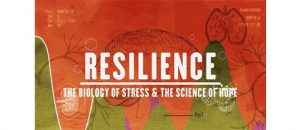The Resilient Beginnings Network at CCI recently screened Resilience: Resilience: The Biology of Stress and The Science of Hope a documentary by the late James Redford, a film that traces the science of Adverse Childhood Experiences (ACEs) and resilience.

As the makers of Resilience explain, “Toxic stress can trigger hormones that weak havoc on the brains and bodies of children, putting them at a greater risk for disease, homelessness, incarceration, and early death. While the broader impacts of poverty worsen the risk, no segment of society is immune. Resilience, however, also chronicles the dawn of a movement that is determined to fight back. Trailblazers in pediatrics, education, and social welfare are using cutting-edge science and field-tested therapies to protect children from the insidious effects of toxic stress—and the dark legacy of [childhood trauma].”
Some of you asked for more information on the research cited by the documentary. Here you can find the thinkers, studies, and resources mentioned in the film, along with some updated statistics on childhood trauma and resilience:
The Resilience film’s Resources section features descriptions of people interviewed in the documentary and a list of organizations and resources devoted to resilience. These include Futures Without Violence, the Center for Youth Wellness, and ACEs Connection, which has created community groups on ACEs and resilience throughout California and the United States. Since the film, ACEs Aware, California’s initiative that serves as the first step toward universal screening of children for ACEs, has also created a website for providers and patients. You can access it here.
The TED talk on ACEs by Dr. Nadine Burke Harris, now California Surgeon General, is an ideal introduction on ACEs (and easily shareable): https://www.youtube.com/watch?v=95ovIJ3dsNk&feature=youtu.be
Dr. Burke Harris’s book, The Deepest Well: Healing the Long-Term Effects of Childhood Trauma, is a powerful, engaging, and in-depth examination of how children can heal from adverse childhood experiences (ACEs), trauma, and toxic stress.
The landmark CDC-Kaiser Permanente ACE study (Drs. Robert Anda and Vincent Felitti) involving 17,000 HMO members from Southern California and published in the American Journal of Preventive Medicine: https://www.ajpmonline.org/article/S0749-3797(98)00017-8/full
Background on the landmark CDC/Kaiser ACE study: https://www.cdc.gov/violenceprevention/aces/about.html
The official ACEs screening tool used in California (PEARLS, designed for de-identified screening): https://www.acesaware.org/screen/screening-tools/
A CDC selection of the hundreds of ACEs studies published after the landmark Felitti/Anda study): https://www.cdc.gov/violenceprevention/aces/resources.html
Information on Jack Shonkoff of Harvard University (featured in the Resilience documentary) and a link to his organization “Center on the Developing Child,” which studies ACEs and healing: https://developingchild.harvard.edu/about/who-we-are/
Resource list from Jack Shonkoff and the Center on the Developing Child: https://developingchild.harvard.edu/resources/# (excellent resources for clinicians and the public alike)
An updated report on the prevalence of ACEs in the U.S.: https://www.childtrends.org/publications/prevalence-adverse-childhood-experiences-nationally-state-race-ethnicity
ChildTrends on racial disparities in ACE scores
An updated CDC webpage with a number of the key findings and statistics on the links between ACEs and disease: https://www.cdc.gov/vitalsigns/aces/index.html#:~:text=Toxic%20stress%20from%20ACEs%20can,and%20substance%20misuse%20in%20adulthood.
TIC Family Resource Center: Information on Miss Kendra’s list
The Center for Care Innovation has also partnered with UCSF, Genentech, and others to support clinics doing ACEs screening and treatment through two major initiatives: The Resilient Beginning Network and CALQIC. We welcome your questions and feedback.
Find this useful or interesting? We’re constantly sharing stuff like this. Sign up to receive our newsletter to stay in the loop.

